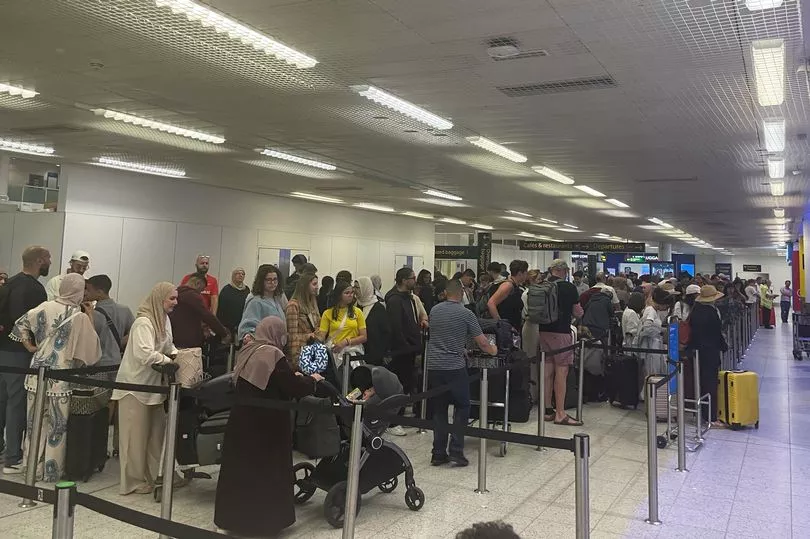Table of Contents
Togglegatwick heathrow flights cancel is this the New Normal?
Image Credit: My London
Introduction:
If you’ve recently traveled through Gatwick or Heathrow, you might have noticed a worrying trend: frequent flight cancellations. These two airports, critical hubs for global travelers, are grappling with unprecedented challenges. From severe weather disruptions to operational bottlenecks, the aviation landscape has shifted dramatically, leading many to wonder, “Is this the new normal?” Let’s dive deeper into the factors behind this phenomenon and what it means for passengers and the aviation industry.
Read Also: 50 days of rain: Fashion Tips for Staying Stylish and Dry
Understanding the Causes of Flight Cancellations:
Weather Disruptions
Weather has always been a factor in air travel, but climate change has upped the stakes. Unpredictable storms, heavy snowfall, and extreme winds are increasingly common, leading to canceled flights. Gatwick and Heathrow, already busy hubs, are especially vulnerable. A recent winter storm, for example, grounded hundreds of flights, leaving passengers stranded. With the climate crisis showing no signs of slowing, weather-related disruptions might only worsen.
Staff Shortages
Post-pandemic, the aviation industry faced massive staff layoffs. While demand for travel rebounded quickly, hiring and training new personnel hasn’t kept pace. Pilots, ground staff, and even air traffic controllers are in short supply. Both Gatwick and Heathrow are feeling the pinch, as airlines struggle to operate their schedules smoothly.
Air Traffic Congestion
London’s skies are among the busiest in the world. Heathrow, being a major international hub, often operates at maximum capacity. Add in delays, and the domino effect can ripple through other flights, causing widespread cancellations. Managing this congestion is an ongoing challenge for air traffic controllers.
Operational Challenges
Technical issues, delayed maintenance, and airline bankruptcies compound the problem. A single technical glitch can lead to hours of delays, pushing schedules off track. Airlines operating on razor-thin margins are also prone to financial troubles, further destabilizing operations.
The Ripple Effect on Passengers:
Increased Travel Costs
Fewer flights mean higher ticket prices. Passengers find themselves paying a premium for flexibility, as reliable schedules become a rarity. Budget travelers especially feel the squeeze, with fewer low-cost options available.
Stranded Passengers
Being stuck at an airport is every traveler’s nightmare. Gatwick and Heathrow have seen their share of chaotic scenes, with passengers queuing for hours to rebook flights or scrambling for alternative transportation. The emotional and financial toll is significant.
Decline in Customer Confidence
Recurring cancellations shake travelers’ trust in airlines. Negative experiences are often shared on social media, tarnishing reputations. If the trend continues, long-term loyalty might take a hit.
Airline Industry Response:
Improved Communication
Airlines are stepping up their game when it comes to keeping passengers informed. Real-time updates via apps and email notifications aim to minimize frustration. Some carriers even offer compensation for delays, though policies vary widely.
Strategic Scheduling
Reducing overbooking and streamlining schedules are top priorities. Airlines are collaborating with Gatwick and Heathrow to ensure a more balanced flow of flights.
Recruitment Drives
To combat staff shortages, airlines are launching aggressive recruitment campaigns. Incentives such as higher salaries and training programs aim to attract talent back to the industry.
Passenger Adaptation Strategies:
Booking with Flexibility
In a world of constant disruptions, flexibility has become a passenger’s best friend. Booking refundable tickets or opting for travel insurance can help safeguard against the financial sting of cancellations. Many airlines now offer fare classes that allow free rebooking—a lifeline for passengers dealing with unexpected changes.
Exploring Alternatives
For travelers in and around the UK, alternatives like train travel or flying from regional airports are increasingly viable options. Trains, for instance, offer a reliable and eco-friendly choice, especially for domestic or short-haul trips. Regional airports like London Stansted or Luton, though smaller, may provide a less congested and more predictable experience.
Staying Informed
Knowledge is power, especially in air travel. Real-time flight tracking apps and social media updates from airlines can help travelers stay ahead of disruptions. Being proactive—checking in early, staying alert for announcements, and knowing your rights—can make all the difference.
Long-Term Implications for the Aviation Industry:
Regulatory Measures
Governments and regulatory bodies are stepping in to address the challenges faced by passengers. In the UK, authorities are working to tighten compensation rules for cancellations and delays. Additionally, international agreements aim to streamline airspace management, reducing congestion and minimizing the risk of cascading disruptions.
Technological Innovations
Advancements in technology offer hope for a smoother flying experience. Automation, AI-driven scheduling systems, and predictive maintenance tools can help airlines identify potential issues before they disrupt operations. Gatwick and Heathrow are also investing in state-of-the-art infrastructure to handle the increasing volume of passengers more efficiently.
Sustainability Challenges
The aviation industry faces a unique challenge: balancing operational demands with environmental responsibility. Airlines are under pressure to adopt greener practices, such as using sustainable aviation fuels (SAFs) and investing in more fuel-efficient aircraft. However, these efforts require time and significant financial resources, potentially leading to short-term growing pains.
Case Studies of Recent Flight Cancellations:
Gatwick Disruptions
Gatwick has experienced several high-profile cancellations in recent years. For instance, a drone incident in 2018 caused massive disruptions, grounding over 1,000 flights. Though not a typical cause, the event highlighted the vulnerability of airport operations to external factors. Recent weather-related cancellations also serve as a reminder of the unpredictable nature of modern air travel.
Heathrow Challenges
As one of the world’s busiest airports, Heathrow faces unique operational hurdles. In 2022, staffing shortages led to a temporary cap on passenger numbers, forcing airlines to cancel hundreds of flights. Despite its robust infrastructure, Heathrow’s reliance on tight schedules leaves little room for error.
Expert Insights and Opinions:
Industry Experts’ Take
Aviation analysts agree that the current wave of cancellations is unlikely to disappear overnight. “The industry is in recovery mode,” says one expert, “but the pace of change is slow.” They emphasize the importance of investments in staff, technology, and sustainable practices to build a more resilient system.
Passenger Perspectives
Frequent travelers are adjusting their expectations. Many now approach air travel with a mix of caution and resignation, planning for potential delays as part of their journey. Some passengers have shared strategies for coping, such as always having a backup plan or traveling during off-peak hours.
Read Also: 50 days of rain: Fashion Tips for Staying Stylish and Dry
Conclusion:
Flight cancellations at Gatwick and Heathrow have become an increasingly common occurrence, sparking widespread frustration among passengers. While the causes—ranging from weather disruptions to staffing shortages—are complex, they underline the fragility of the modern aviation ecosystem.
However, the outlook isn’t entirely bleak. Airlines, regulators, and passengers alike are adapting to this “new normal,” with a focus on improving communication, implementing smarter scheduling, and investing in long-term solutions. While challenges remain, the industry’s ongoing efforts offer hope for a future where air travel becomes more predictable and passenger-friendly.
FAQs:
1. Why are Gatwick and Heathrow experiencing so many cancellations?
Cancellations are caused by a combination of factors, including severe weather, staffing shortages, air traffic congestion, and operational challenges.
2. How can passengers minimize the impact of flight cancellations?
Booking flexible tickets, staying informed through flight tracking apps, and considering alternative travel options like trains or regional airports can help.
3. What role does climate change play in flight disruptions?
Climate change has led to more severe weather patterns, such as storms and heavy snowfall, which frequently disrupt flight schedules.
4. Are airlines doing enough to address operational challenges?
Airlines are making efforts to improve communication, recruit staff, and streamline schedules, but the recovery process is slow and requires significant investment.
5. What is the future of air travel in light of these issues?
While challenges persist, advancements in technology, regulatory measures, and sustainable practices offer hope for a more reliable and efficient air travel experience in the coming years.




